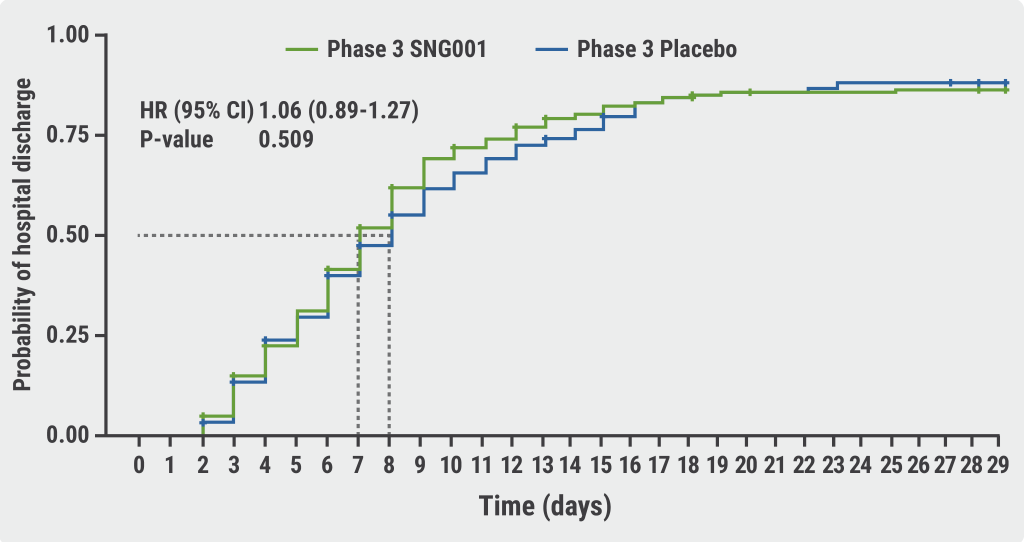https://doi.org/10.55788/17ebfca9
The phase 3, randomised, placebo-controlled, double-blind, SPRINTER study (NCT04732949) assessed the efficacy and safety of inhaled interferon-β (SNG001) for the treatment of adults hospitalised due to COVID-19 who required treatment with supplemental oxygen by mask or nasal prongs [1]. The rationale behind this trial was based on recent promising phase 2 results [2]. The trial, presented by Dr Philip Monk (Synairgen Research LtD, UK), randomised 623 patients to receive SNG001 (n=309) or placebo (n=314) on top of standard-of-care [1]. Patients requiring high-flow nasal oxygen therapy, non-invasive ventilation, or endotracheal intubation (invasive ventilation) at randomisation were excluded. Participants self-administered SNG001 once daily as a nebulised dose (15.6 mIU) or placebo for 14 days on top of standard-of-care. The primary endpoint was time to hospital discharge and time to recovery to “no limitation of activities” up to day 28. Key secondary endpoints were progression to severe disease or death within 35 days and progression to intubation.
The primary endpoint was not met; the use of SNG001 did not improve the time to hospital discharge (HR 1.06; 95% CI 0.89–1.27; P=0.509, see Figure). None of the key secondary endpoints pointed to a significant difference either. However, in subgroup analyses, there was an encouraging signal in the reduction in the relative risk of progression to severe disease or death within 35 days (25.7% reduction in the intention-to-treat population and 36.3% reduction in the per-protocol population).
Figure: Primary endpoint of SPRINTER: time to hospital discharge [1]

Dr Monk explained that the investigators further enriched for a responder population and focused on the secondary endpoint of progression to severe disease or death. To assess the strength of this signal and identify specific patient populations that might benefit most from treatment, subgroup analyses were performed on groups of patients recognised to be at greater risk of developing severe disease in hospital. These analyses included patients ≥65 years old, those with comorbidities associated with worse COVID-19 outcomes, and those who, at baseline, despite receiving low-flow oxygen, had clinical signs of compromised respiratory function (defined as oxygen saturation of ≤92% or respiratory rate ≥21 breaths/min). In this latter group, data showed a 70% drop in patients taking SNG001 progressing to severe disease versus the control group (P=0.046). This was not observed in the overall intention-to-treat population, although there was a trend to reduced progression by 26% in patients treated with SNG001 versus placebo (P=0.161).
SNG001 was well tolerated in the SPRINTER trial, with a favourable safety profile consistent with previous studies. The proportion of participants with any treatment-emergent adverse events was 22.6% in the group receiving SNG001 versus 25.4% in the placebo arm. Likewise, the proportion of participants with any serious treatment-emergent adverse event was 12.6% in the investigational arm and 18.2% in the placebo arm. The serious adverse events most often reported were infections/infestations and respiratory, thoracic, and mediastinal disorders.
In conclusion, while the primary efficacy endpoint was not met, there were trends in favour of SNG001 in the prevention of COVID-19 progression to severe disease or death. Subgroup analyses supported a mild benefit.
- Monk P, et al. SPRINTER: A Randomized, Double-Blind, Placebo-Controlled, Phase 3 Trial to Determine the Efficacy and Safety of Inhaled Interferon Beta-1a (SNG001) for the Treatment of Patients Hospitalized Due to COVID-19. Session B12, ATS International Conference 2022, San Francisco, CA, USA, 13–18 May.
- Monk PD, et al. Lancet Respir Med. 2021 Feb;9(2):196–206.
Copyright ©2022 Medicom Medical Publishers
Posted on
Previous Article
« Nebulised aviptadil “futile” in I-SPY COVID-19 trial Next Article
Letter from the Editor »
« Nebulised aviptadil “futile” in I-SPY COVID-19 trial Next Article
Letter from the Editor »
Table of Contents: ATS 2022
Featured articles
Letter from the Editor
COVID-19
Nebulised aviptadil “futile” in I-SPY COVID-19 trial
Lung transplantation after COVID-19-associated ARDS
Mesenchymal stem cells offer no benefit in COVID-19
Alpha-1 antitrypsin for ARDS secondary to severe COVID-19
Frailty prevalent 5 months following hospitalisation for COVID-19
Paediatric long COVID lacks definitions
Asthma Clinical Trial Updates
MANDALA and DENALI pattern success for albuterol-budesonide in asthma
ACOUSTICS data sounds good for adolescent asthma exacerbations
Type 2 asthma in children managed by dupilumab, despite atopic comorbidities
NAVIGATOR steers asthma patients to tezepelumab
High-intensity interval training slashes daily corticosteroids in asthma
Chronic Obstructive Pulmonary Disease
Three’s a crowd for triple therapy in COPD
Higher 1-year COPD mortality after hospitalisation for White patients
Reducing dyspnoea in chronic lung disease through weight loss
CT-evident mucus plugs in COPD associated with death
Home-based rehabilitation improves COPD: a randomised study
Highlighted Advances
Novel P2X3 antagonist can SOOTHE chronic cough
Colistimethate sodium PROMISing for non-cystic fibrosis bronchiectasis
Is avacopan better than prednisone for respiratory ANCA-associated vasculitis outcomes?
PAGANINI phase 2b data promising for eliapixant
POISE-3: Tranexamic acid for non-cardiac surgery
Obstructive sleep apnoea in most children with pulmonary hypertension
No screening evidence for COPD
Novel PDE4B inhibitor offers breakthrough for IPF
Hydrocortisone does not help preterm infants
CPAP temporarily supports pulmonary oxygenation in morbidly obese patients
ISAACC trial: CPAP controls blood pressure in ACS patients with severe OSA
Related Articles
October 30, 2022
In the spotlight: Cancer trends in obstructive sleep apnoea
October 29, 2020
Physical activity improves AHI in sleep apnoea patients
© 2024 Medicom Medical Publishers. All rights reserved. Terms and Conditions | Privacy Policy
HEAD OFFICE
Laarderhoogtweg 25
1101 EB Amsterdam
The Netherlands
T: +31 85 4012 560
E: publishers@medicom-publishers.com

